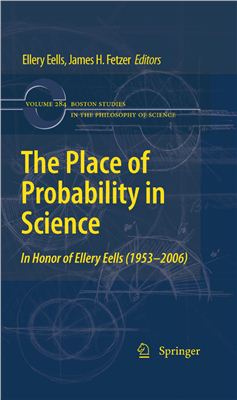Springer, 2010. - 368 pages.
The purpose of philosophy, broadly conceived, can be described as that of attempting to resolve heretofore unsolved conceptual and theoretical problems, especially those that lie at the foundations of knowledge and values. Given the central role of science in acquiring reliable knowledge, the study of science has become of special importance within philosophy. And within philosophy of science, in tu, no other concept possesses the centrality and importance as does that of probability. To clarify and illuminate the place of probability in science Ellery Eells and James H. Fetzer have brought together some of the most distinguished philosophers from our time.
After a comprehensive introduction to alteative conceptions of objective probability and the difficulties that they confront, three studies describe the special problems that arise within this context and the comparative merits of different accounts. The second section addresses the nature of lawfulness and of relations between micro- and macro-probabilities, especially with reference to the concept of fitness in evolution. The third section confronts some of the difficulties confronted by causal conceptions of probability, especially within the quantum domain. The fourth extends the discussion to principles of inference and decision. The last chapter relates propensities and frequencies to the framework of inference to the best explanation
The purpose of philosophy, broadly conceived, can be described as that of attempting to resolve heretofore unsolved conceptual and theoretical problems, especially those that lie at the foundations of knowledge and values. Given the central role of science in acquiring reliable knowledge, the study of science has become of special importance within philosophy. And within philosophy of science, in tu, no other concept possesses the centrality and importance as does that of probability. To clarify and illuminate the place of probability in science Ellery Eells and James H. Fetzer have brought together some of the most distinguished philosophers from our time.
After a comprehensive introduction to alteative conceptions of objective probability and the difficulties that they confront, three studies describe the special problems that arise within this context and the comparative merits of different accounts. The second section addresses the nature of lawfulness and of relations between micro- and macro-probabilities, especially with reference to the concept of fitness in evolution. The third section confronts some of the difficulties confronted by causal conceptions of probability, especially within the quantum domain. The fourth extends the discussion to principles of inference and decision. The last chapter relates propensities and frequencies to the framework of inference to the best explanation

